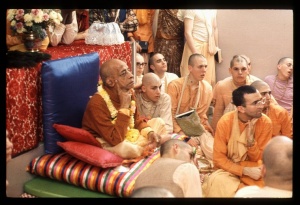SB 9.15.8: Difference between revisions
No edit summary |
(Vanibot #0054 edit - transform synonyms into clickable links, which search similar occurrences) |
||
| Line 23: | Line 23: | ||
<div class="synonyms"> | <div class="synonyms"> | ||
''saḥ'' | ''[//vanipedia.org/wiki/Special:VaniSearch?s=saḥ&tab=syno_o&ds=1 saḥ]'' — he (Ṛcīka); ''[//vanipedia.org/wiki/Special:VaniSearch?s=ṛṣiḥ&tab=syno_o&ds=1 ṛṣiḥ]'' — the great saint; ''[//vanipedia.org/wiki/Special:VaniSearch?s=prārthitaḥ&tab=syno_o&ds=1 prārthitaḥ]'' — being requested; ''[//vanipedia.org/wiki/Special:VaniSearch?s=patnyā&tab=syno_o&ds=1 patnyā]'' — by his wife; ''[//vanipedia.org/wiki/Special:VaniSearch?s=śvaśrvā&tab=syno_o&ds=1 śvaśrvā]'' — by his mother-in-law; ''[//vanipedia.org/wiki/Special:VaniSearch?s=ca&tab=syno_o&ds=1 ca]'' — also; ''[//vanipedia.org/wiki/Special:VaniSearch?s=apatya&tab=syno_o&ds=1 apatya]-[//vanipedia.org/wiki/Special:VaniSearch?s=kāmyayā&tab=syno_o&ds=1 kāmyayā]'' — desiring a son; ''[//vanipedia.org/wiki/Special:VaniSearch?s=śrapayitvā&tab=syno_o&ds=1 śrapayitvā]'' — after cooking; ''[//vanipedia.org/wiki/Special:VaniSearch?s=ubhayaiḥ&tab=syno_o&ds=1 ubhayaiḥ]'' — both; ''[//vanipedia.org/wiki/Special:VaniSearch?s=mantraiḥ&tab=syno_o&ds=1 mantraiḥ]'' — by chanting particular ''mantras''; ''[//vanipedia.org/wiki/Special:VaniSearch?s=carum&tab=syno_o&ds=1 carum]'' — a preparation for offering in a sacrifice; ''[//vanipedia.org/wiki/Special:VaniSearch?s=snātum&tab=syno_o&ds=1 snātum]'' — to bathe; ''[//vanipedia.org/wiki/Special:VaniSearch?s=gataḥ&tab=syno_o&ds=1 gataḥ]'' — went out; ''[//vanipedia.org/wiki/Special:VaniSearch?s=muniḥ&tab=syno_o&ds=1 muniḥ]'' — the great sage. | ||
</div> | </div> | ||
Latest revision as of 23:45, 18 February 2024

His Divine Grace
A.C. Bhaktivedanta Swami Prabhupada
A.C. Bhaktivedanta Swami Prabhupada
TEXT 8
- sa ṛṣiḥ prārthitaḥ patnyā
- śvaśrvā cāpatya-kāmyayā
- śrapayitvobhayair mantraiś
- caruṁ snātuṁ gato muniḥ
SYNONYMS
saḥ — he (Ṛcīka); ṛṣiḥ — the great saint; prārthitaḥ — being requested; patnyā — by his wife; śvaśrvā — by his mother-in-law; ca — also; apatya-kāmyayā — desiring a son; śrapayitvā — after cooking; ubhayaiḥ — both; mantraiḥ — by chanting particular mantras; carum — a preparation for offering in a sacrifice; snātum — to bathe; gataḥ — went out; muniḥ — the great sage.
TRANSLATION
Thereafter, Ṛcīka Muni's wife and mother-in-law, each desiring a son, requested the Muni to prepare an oblation. Thus Ṛcīka Muni prepared one oblation for his wife with a brāhmaṇa mantra and another for his mother-in-law with a kṣatriya mantra. Then he went out to bathe.